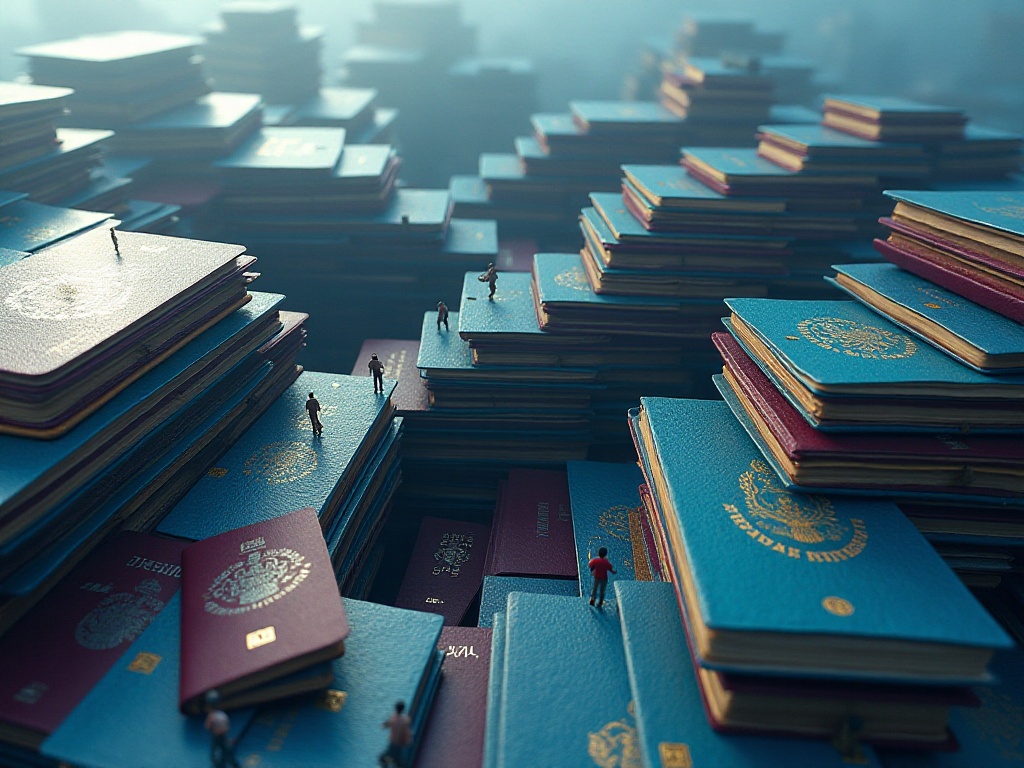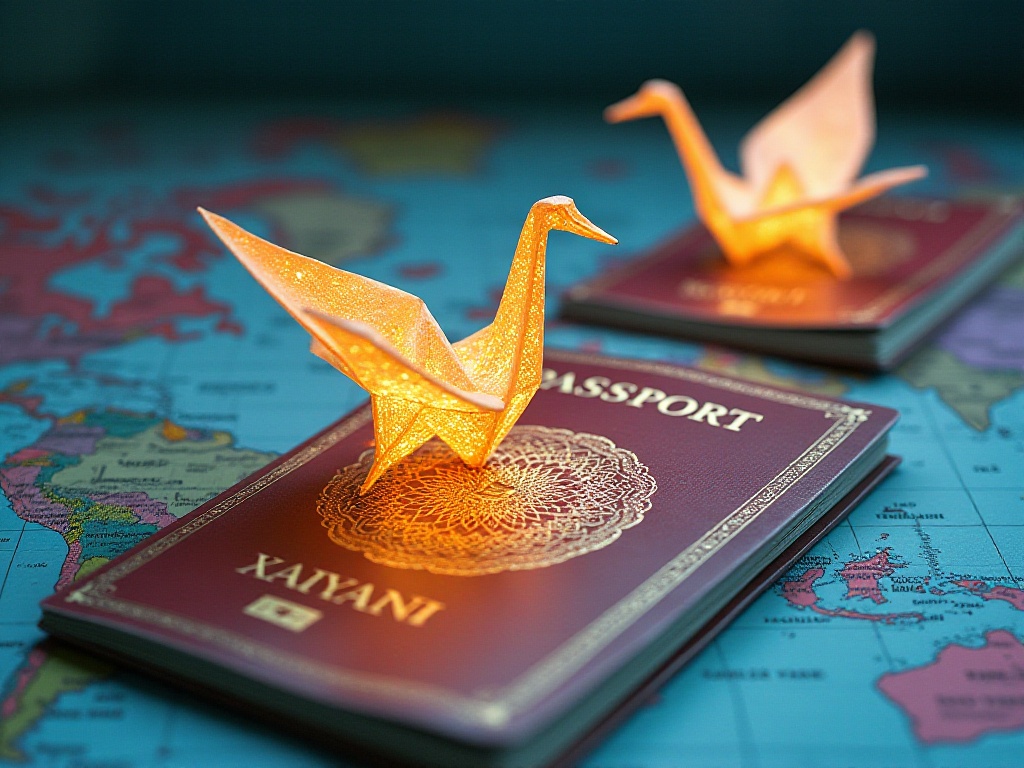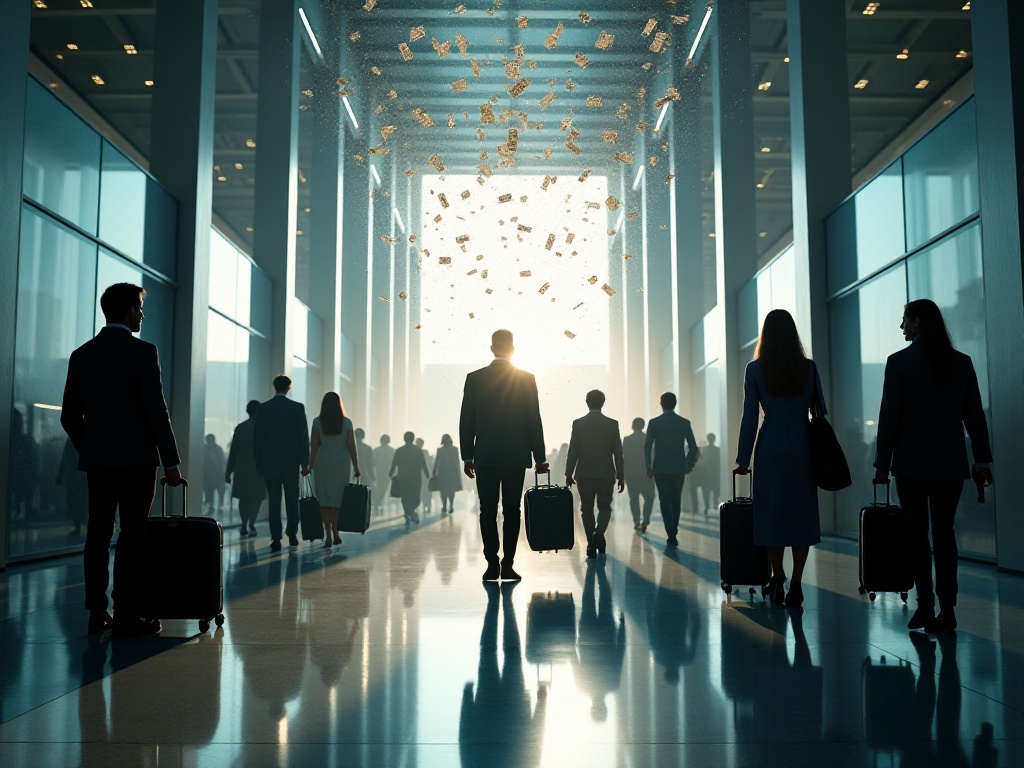Visa Basics
A visa is an entry permit issued by a country. As a newcomer to international travel, you might find it particularly troublesome and wonder why it has to be so complicated. The reason behind it is actually quite interesting.
Every country wants to know the identity of foreigners entering their territory, how long they plan to stay, and their purpose of visit. It's similar to providing your delivery address and contact information when shopping online. A visa is like a detailed registration form that records your basic information, purpose of visit, and duration of stay.
When I applied for my first visa, I was completely lost and had no idea where to start. After years of experience, I've discovered that visas aren't so scary. It's like a pass that tells the local government: "Hey, I'm here to visit and won't cause any trouble, trust me!"
Now different countries have different types of visas, some simple and some complex. The most basic ones are usually divided into tourist visas, business visas, student visas, etc. Each type has its own application requirements and duration limits. For example, tourist visas generally only allow you to travel and not work for money; student visas allow you to study locally, and some countries even permit students to work part-time.
United States Section
The U.S. visa is definitely one of the most challenging visas to obtain. When I first applied for a U.S. visa, just preparing the materials took several days. There were so many things to prepare: bank statements, employment verification, property certificates, travel itinerary - it felt more demanding than writing a thesis.
U.S. visitor visas mainly come in two types: B-1 and B-2. B-1 is a business visa for those who need to conduct business or attend meetings in the U.S. B-2 is a tourist visa, suitable for those who want to visit Disney, see the Grand Canyon, or visit relatives.
The most practical is the B-1/B-2 combination visa, which is absolutely fantastic. Why? Because it's super flexible - you can go to the U.S. for business, and then take a few days to travel afterward without any issues. Plus, this type of visa is usually valid for 10 years, which is especially long.
The most nerve-wracking part of applying for a U.S. visa is the interview. I remember not being able to sleep the night before my first interview. But later I found out that the visa officer just asked a few basic questions: What are you going to do in the U.S.? How long will you stay? Where do you work? There's really no need to be too nervous.
During the interview, it's important to be sincere and give concise answers. Don't ramble or say anything vague. Visa officers interview many people every day, and they dislike applicants who talk too much.
I had a friend with an interesting interview experience. When the visa officer asked why he wanted to go to the U.S., he said he wanted to see Broadway musicals in New York. The officer became interested and chatted with him about musicals before approving his visa. So, honest reasons are often the best reasons.

Global Perspective
Looking globally, countries are becoming increasingly friendly to Chinese tourists. When I first started traveling abroad, getting a visa was as difficult as taking an exam. Now many countries offer visa-free or visa-on-arrival policies for Chinese citizens, which has made things much easier.
For major tourist destinations like Thailand, they now offer visa-on-arrival. You just need to prepare photos, documents, and visa fees, and you can get it at the airport. However, I should remind everyone that even though it's visa-on-arrival, you should prepare all materials in advance rather than waiting until you arrive.
There are also some less common but interesting countries, like Georgia and Morocco, that have very open visa policies. These places have unique scenery, special cultures, and fewer tourists, making them great travel choices.
However, there's one important point to note: even for visa-free countries, there are many things to pay attention to. The most basic is passport validity. I had a friend who was denied entry at the local airport because his passport only had 5 months of validity remaining, wasting his airfare. So be sure to carefully check the entry requirements of your destination country before departing.
Now many countries are implementing electronic visas, where you fill out forms and upload materials online, and receive the electronic visa via email after approval. This method is particularly convenient and saves a lot of time running around. However, be careful about the authenticity of electronic visas and operate through official websites to avoid scams.
I often see people asking online: "Is it easy to get a visa for XX country?" Actually, there's no standard answer to this question. The same country might have completely different requirements for different applicants. The key is to understand whether your conditions meet the requirements and whether your prepared materials are complete and sufficient.

Practical Tips
Speaking of specific operations, I've summarized many useful tips over the years. First is the issue of passport validity. Now basically all countries require at least 6 months of remaining passport validity. But I suggest having at least 9 months to be safe. Because you never know what unexpected situations you might encounter during travel that might require extending your stay.
When your passport is about to expire, it's recommended to start applying for a new one 8-9 months in advance. Getting a new passport is quite convenient now, and the processing speed is quite fast. With a new passport, it's much easier to apply for visas and book flights and hotels.
Regarding visa interviews, many people get particularly nervous. Actually, there's no need - visa officers value honesty the most. After going through more than a dozen interviews, I've found that as long as you're well-prepared and genuine, the chances of approval are high. During the interview, maintain a neat appearance, answer questions concisely, and maintain a natural and confident attitude.
Preparation of visa materials is also crucial. I suggest making a checklist and organizing the required materials in order. Especially for important documents like proof of assets and employment verification, it's best to prepare several copies as backup.
Many people worry that their poor English will affect the interview. Actually, there's no need to worry too much, as many embassies and consulates have Chinese translators. Plus, visa officers mainly focus on whether your materials are genuine and whether you have sufficient reasons to visit their country - language communication is secondary.
Waiting for visa results also tests one's patience. Processing times vary greatly between countries - some might take a few days, others might take several months. When planning your itinerary, it's advisable to leave plenty of time for processing. If time is tight, you can choose express service, which although more expensive, can greatly reduce waiting time.
Visa fees are also a factor to consider. Fee standards vary greatly between countries - some might only cost a few hundred yuan, others might cost thousands. And some countries' visa fees are non-refundable, even if the application is rejected. So consider this expense carefully before applying.

Deep Thoughts
My years of travel experience have given me a deeper understanding of the visa system. It actually reflects an interesting phenomenon in the globalization process. On one hand, connections between countries are becoming increasingly close and personnel exchanges more frequent; on the other hand, every country is trying to balance openness and control, wanting to promote international exchange while ensuring national security.
Now many countries are implementing smarter entry management systems, such as biometric technology and electronic visa systems. These new technologies have greatly improved efficiency and made cross-border travel more convenient. But they've also brought new issues, such as personal information security and data protection.
I think the visa system might change significantly in the future. With technological development, traditional sticker visas might be replaced by more advanced electronic systems. But regardless of how the form changes, the essential function of visas probably won't change - it will remain an important tool for managing international personnel movement.

Planning Suggestions
For newcomers wanting to start international travel, I suggest beginning with easily obtainable visas. For example, some Southeast Asian countries have relatively relaxed visa policies and simpler application processes. This way you can gain experience in preparation for applying for more difficult visas later.
When applying for visas, pay attention to the following points: First, choose the appropriate visa type. For example, if you're purely traveling, don't apply for a business visa as this might increase the risk of rejection. Second, ensure all materials are genuine and valid. Any falsification could lead to rejection and affect future visa applications to other countries. Finally, arrange application timing reasonably and leave enough buffer time.
Many people find visa procedures particularly troublesome, but from another perspective, it's also a growth experience. Through preparing visa materials, we learn how to plan itineraries and manage personal documents - these are very useful skills. Plus, when you finally get your visa, that sense of achievement is very special.
Remember, the meaning of travel isn't just about the destination, but also about the experiences and growth along the way. Although visas are complicated, they're our first step in exploring the world. Let's carry our curiosity and patience as we step out to see this wonderful world. Through continuous attempts and accumulation, you'll surely master various visa application techniques and make your travel journey go further and become more wonderful.


